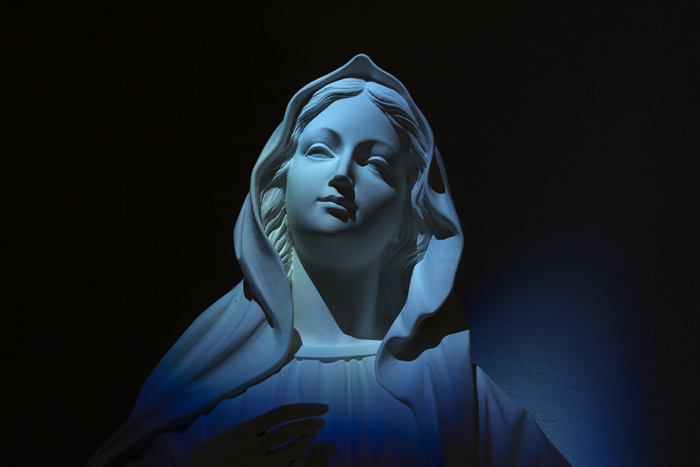Advent Apologetics: Who Is “Mary of Nazareth?”
Though she became the most famous woman in the history of the world, Mary was born a simple Jewish girl from a poor family in the house of David,i some 2,000 years ago. When she was fourteen or fifteen years old, God chose her to be the mother of Jesus Christ, God incarnate; this simple teenage girl, then became the Mother of God.ii She was, as a matter of history, called to the unique task of bringing the Messiah into the world.
Mary is a sign to us all how God loves to choose “what is weak in the world to shame the strong” (1 Cor. 1:27).
Mary’s life and identity are really all about her divine son, Jesus Christ. Her greatness, her holiness, in fact, anything of eternal value in her at all, comes entirely through her relationship with him. In Mary’s words, “All generations will call me blessed; for he who is mighty has done great things for me, and holy is his name” (Luke 1:48-49).
According to the context of Luke 1 (especially verses 26-38), “great things” refers to Mary having just conceived Jesus in her womb. Mary’s “blessed” state, then, exists solely because of the divine Christ-child within her.
When Mary’s cousin Elizabeth encounters Mary soon after Mary conceived Jesus, in Luke 1:42-43, she gives us more insight into just who Mary of Nazareth is when she “exclaim[s] with a loud cry… Why is this granted me, that the mother of my Lord should come to me.”
First, we note the reference to Mary as “Mother of the Lord,” Jesus Christ. But if we understand its Old Testament antecedent, this God-inspired declaration becomes even more illuminating. Elizabeth was referring, almost verbatim, to a text from 2 Samuel 6:9 wherein David exclaims concerning the Old Testament Ark of the Covenant, “And David was afraid of the LORD that day; and he said, ‘How can the ark of the LORD come to me?’”
The Ark of the Covenant, we know, was especially holy, and called the ark of almighty God because it contained within it three types or prefigurements of Jesus Christ. According to Hebrews 9:4, it contained the high priest Aaron’s miraculous staff, a sample of the miraculous bread from heaven—the manna—and the Ten Commandments, or “Ten Words” (dabar in Hebrew means “word” or “commandment”).
Mary carried within her our true High Priest (Heb. 3:1), the true “manna from heaven” (John 6:31-32), and the Word made flesh (John 1:14). Thus, she is the true Ark of the New Covenant.
Mary is correctly called Mother of God because Jesus Christ, her son, is God. To deny this essential truth of the faith, as the Council of Ephesus (431) declared, is to cut oneself off from full communion with Christ and his Church. In the first of many anathemas or condemnations of St. Cyril (the famous fifth-century bishop of Alexandria) that would be accepted by the Council, it decreed:
If anyone does not confess that God is truly Emmanuel, and that on this account the Holy Virgin is the Mother of God (for according to the flesh she gave birth to the Word of God become flesh by birth), let him be anathema.
In its definition the council referred to the prophecy of Isaiah 7:14, which prophesied over 700 years before the birth of Christ that the Messiah was to be born of a woman and yet he was to be “God with us.” Thus, we have evidence from both the Old and New Testaments testifying to Mary as Mother of God.
The Catechism of the Catholic Church (CCC) sums up everything for us:
Called in the Gospels “the mother of Jesus,” Mary is acclaimed by Elizabeth, at the prompting of the Spirit and even before the birth of her son, as “the mother of my Lord.” In fact, the One whom she conceived as man by the Holy Spirit, who truly became her Son according to the flesh, was none other than the Father’s eternal Son, the second person of the Holy Trinity. Hence the Church confesses that Mary is truly “Mother of God” (CCC 495). - From 20 Answers: Mary
Recent Posts
-
Medicine for the Soul
When people ask me why they need to go to see a priest in confession instead of going “directly to …Feb 19th 2026 -
What's Right, and What's Wrong—Salvation Hangs In the Balance
The Catholic Church teaches us what actions are gravely sinful and must be avoided so we do not for …Feb 17th 2026 -
Hasty Generalizations and True Scotsmen
No True Scotsman is a type of logical fallacy that involves making exceptions when a claim is contr …Feb 16th 2026










